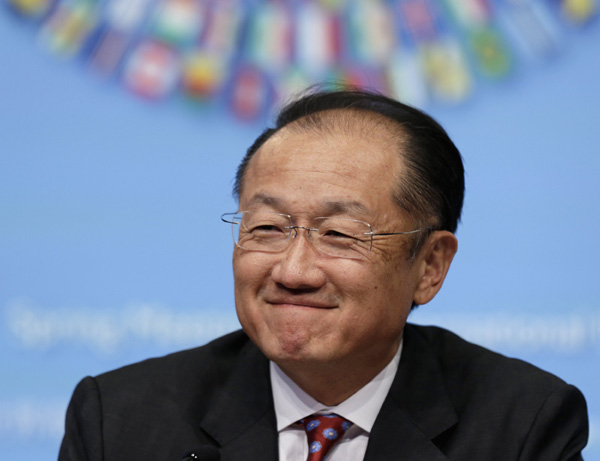


World Bank Group President Jim Yong Kim reacts during a news conference in Washington April 10, 2014. [Photo/Agencies]
While the China-led Asian Infrastructure Investment Bank has been receiving much attention lately, the World Bank Group convened in Washington, D.C. over the weekend for its spring meetings. Among other things, the participants discussed matters regarding development finance, sustainable development and climate change in the lead up to major global conferences on these issues this year. Central to all of this is the review of the Bank's operational Environmental and Social Safeguard Policies.
The Safeguards have long been a cornerstone of the Bank's lending and delivery of development outcomes that both benefit and protect the poorest people. The current review process provides a much needed and timely opportunity to update these standards, responding to new challenges such as increased pressure on natural resources, including land, and the threat of climate change.
The first two phases of the Safeguards review and consultation were conducted from 2012 to 2014; through these, a first draft was produced. The draft addressed new issues including land tenure, climate change and gender, and provided more clarity on the use of country systems. These improvements are welcome, however, the draft has serious deficiencies and ambiguities.
For one, the recently released audits on resettlement practices at the Bank reveal system-wide failures to assess, manage, track and mitigate the suffering of people who have lost their homes and livelihoods as a result of the Bank's loans. In over half of the cases studied, the Bank simply did not know what happened to them, much less whether it had helped improve these people's situations. In fact, startling revelations recently from the International Consortium of Investigative Journalists have exposed abusive and unaccountable World Bank lending, and that the Bank's projects have displaced 3.4 million people in the past decade while failing to protect them.
However, the Bank's current draft resettlement Safeguards do not address these failures, further exacerbating the problem. They fail to make mandatory up-front assessments of the planning and resourcing of resettlement requirements. For example, the draft deletes the need for baseline surveys of affected communities and the requirement that resettlement have a sustainable development objective, which has left communities even more vulnerable.
Aside from affecting communities as a whole, failing to address these problems has ramifications for women in particular. While the current policy draft gives mention in some places to the participation of women in decision-making and the avoidance of discrimination against people based on gender, there is little commitment to ensure more gender equitable outcomes. Gender dynamics in all impact and risk assessments should be ensured to enable thorough analysis of women's interests in areas such as livelihoods options and roles, gender and power relations. Hence, there need to be stand-alone commitments to women's participation and well-being, as well as the integration of women and gender issues throughout the Safeguards.
Moreover, contrary to the Bank making laudable statements on the merits of addressing climate change in order to fight poverty, the current Safeguards draft lacks mandatory requirements for assessing the low carbon benefits and climate resilience needs of people and ecosystems. It also fails to integrate other Bank tools such as the International Development Association climate risk screening and the Energy Sector Management Assistance Program into the draft.
While the current draft Safeguards provide some helpful ways to assess the Bank's use of country systems, there also need to be strengthened procedures to determine the equivalence and acceptability of a country's own systems in line with best practices and open accountability.
If the weaknesses of the current Safeguards draft are left unchecked, they could undermine the development effects of the billions of dollars the Bank lends, expose the institution to significant reputational risk, and, most importantly, continue to cause harm to the millions of poor people affected by the Bank's projects who need protection through strong safeguards and effective implementation.
It is therefore imperative that the Bank's board and management strengthen their Safeguards so that they remain a vehicle for effective development, poverty alleviation and promoting shared prosperity. In this way, they can set a good example to other new players in development finance such as the Asian Infrastructure Investment Bank and the New Development Bank to bring about a positive and greater change in the lives of people living in poverty as they had set out to do.
The author is the manager of Oxfam's China and the Developing World Programme.

 J-11 fighters in air exercise
J-11 fighters in air exercise Beauties dancing on the rings
Beauties dancing on the rings Attendants-to-be join Mr. & Miss Campus Contest
Attendants-to-be join Mr. & Miss Campus Contest Beijing's toughest anti-smoking law takes effect
Beijing's toughest anti-smoking law takes effect Family lives in cave for about 50 years in SW China
Family lives in cave for about 50 years in SW China PLA soldiers operating vehicle-mounted guns in drill
PLA soldiers operating vehicle-mounted guns in drill Blind carpenter in E China's Jiangxi
Blind carpenter in E China's Jiangxi China hosts overseas disaster relief exercise for the first time
China hosts overseas disaster relief exercise for the first time 20 pairs of twins who will become flight attendants in Sichuan
20 pairs of twins who will become flight attendants in Sichuan Obama is sowing discontent in S.China Sea
Obama is sowing discontent in S.China Sea Rescuers work through night to reach cruise ship survivors
Rescuers work through night to reach cruise ship survivors Driving through limbo
Driving through limbo Facing down MERS
Facing down MERSDay|Week